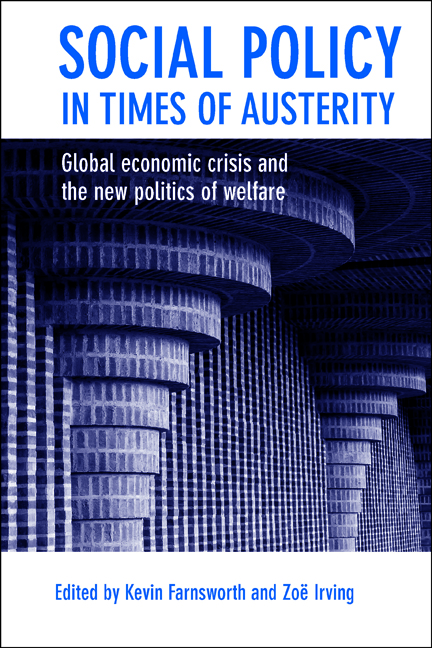Book contents
- Frontmatter
- Contents
- List of figures and tables
- Notes on contributors
- Acknowledgements
- Introduction Social policy in the age of austerity
- one Austerity: more than the sum of its parts
- two Conventional wisdom on government austerity: UK politics since the 1920s
- three The economics of austerity
- four Neoliberalism, finance-dominated accumulation and enduring austerity: a cultural political economy perspective
- five Alternatives to austerity
- six Crisis, convulsion and the welfare state
- Conclusion A new politics of welfare
- Index
Conclusion A new politics of welfare
Published online by Cambridge University Press: 11 March 2022
- Frontmatter
- Contents
- List of figures and tables
- Notes on contributors
- Acknowledgements
- Introduction Social policy in the age of austerity
- one Austerity: more than the sum of its parts
- two Conventional wisdom on government austerity: UK politics since the 1920s
- three The economics of austerity
- four Neoliberalism, finance-dominated accumulation and enduring austerity: a cultural political economy perspective
- five Alternatives to austerity
- six Crisis, convulsion and the welfare state
- Conclusion A new politics of welfare
- Index
Summary
Prior to 2008, the idea of austerity in popular discourse was captured in its cultural–political association with post-war lives – frugality and the ‘make do and mend’ approach to consumption, that contrasts sharply with the waste and disposability that characterise advanced economies in the twenty-first century. With more specific reference to social policy, the work of Paul Pierson (1998; 2001, pp 411–13) on ‘coping with permanent austerity’ provided a new perspective on the nature of the fiscal stress that afflicted advanced economies from the 1970s. In this he argued that in addition to the brake applied by institutions to radical change, such was the strength of political mobilisation in support of the welfare state that its continuing presence was basically secure. What the chapters in this book have shown is that this basic security is now threatened in ways hitherto not foreseen.
Since 2008, austerity has taken on far greater significance as the logic driving fiscal decisions, but also as an ideological tool with which the state can be whittled away. Despite its significance for public policies and welfare states however, as pointed out in the introduction to this volume, austerity in the ‘new age’ is not in reality so easy to define or measure. The ambiguities deriving from its role as both economic and political strategy are its strengths. In economic terms, it is difficult to mount a credible intellectual challenge to an idea that is so modest – captured in Mr Micawber's happiness–misery adage in Michael Hill's chapter – and yet so fantastical – the notion of ‘expansionary fiscal contraction’ professed by modern day proponents. In political terms, it is also difficult to challenge policies that are pre-packaged as essential medicine that is ‘harmful if swallowed’. As Bob Jessop notes, the politics of austerity is ‘crafty’ and electorates have mainly voted for harm. The difference between this age and the past lies in this successful framing of austerity as the only way forward, its transposition from an underlying condition of governmental constraint to an active governmental strategy, and the various ways in which sources of opposition have been blocked.
The chapters in this volume have addressed questions emerging from four broad themes that we consider essential to a better understanding of austerity in the post-2008 context.
- Type
- Chapter
- Information
- Social Policy in Times of AusterityGlobal Economic Crisis and the New Politics of Welfare, pp. 171 - 176Publisher: Bristol University PressPrint publication year: 2015



